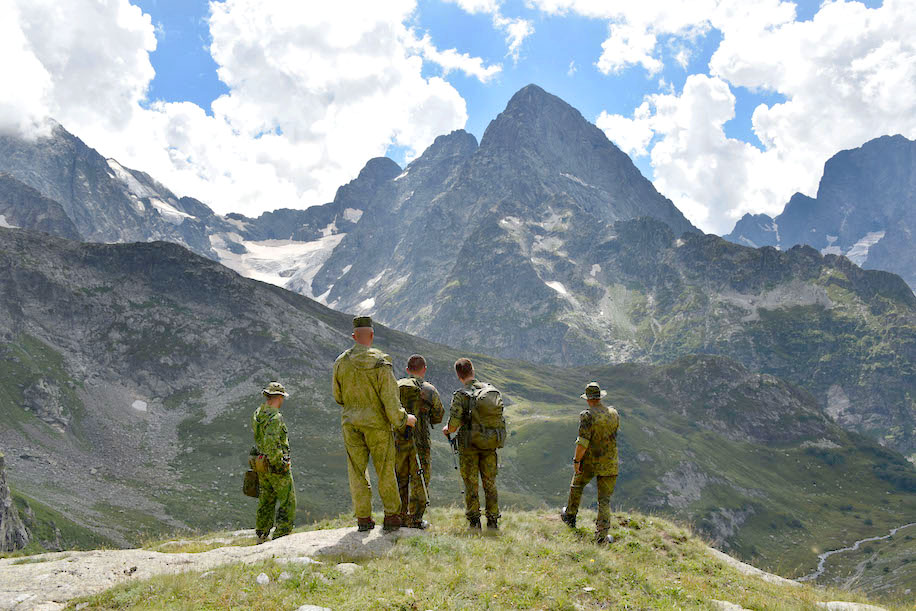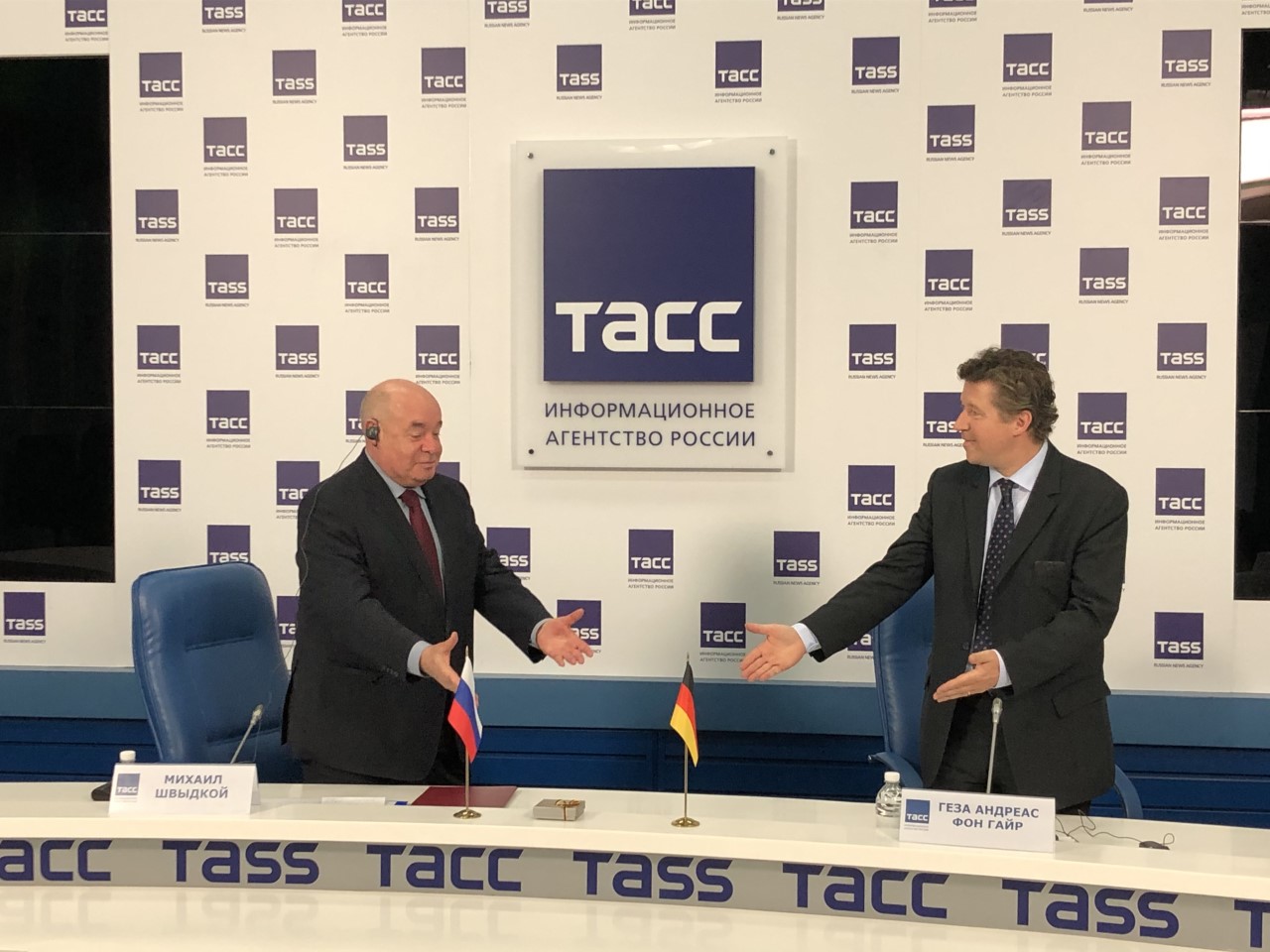German and Russian authorities have achieved a new level of bilateral cooperation to overcome their nations’ bitter World War II history with a new archival sharing agreement launched this year. The two countries will share digital copies of historical records and data to clarify the identities and fates of millions of German and Russian war dead who vanished into obscurity.
Beginning the process for the 75th anniversary of the end of World War II, German and Russian authorities held a May 6 ceremonial handover in Moscow of a digital drive containing approximately 20,000 copies of records from Germany on Soviet prisoners of war.
“We were unanimous that the anniversary of the end of the war was a suitable date for the handover of the first archival documents,” Dr. Heike Winkel, the German War Graves Commission’s project coordinator for the initiative, told Military History magazine in an exclusive interview. She added that the handover was “not a one-time action.” “Further handovers will follow as part of the project.”
The documents—including information cards, letters, medical records and burial data—will provide academic institutions in both countries and surviving relatives with details on the identities and fates of wartime prisoners.
“Thanks to the many years of painstaking work of historians, archivists and technical experts of the two countries, light will be shed on the fate of about 8 million people,” Sergei Lavrov, Russia’s minister of foreign affairs, said in a written statement released on the occasion.
According to Russian news agency TASS, this project was initiated in a joint statement by Lavrov and German Foreign Affairs Minister Frank-Walter Steinmeier in June 2016.
Winkel, project coordinator for the initiative “Soviet and German Prisoners of War and Detainees,” said Germany’s Federal Archive (Bundesarchiv) hopes to assemble documents on at least 335,000 people in coming years from archives in Russia, Germany and other countries and share findings with Russian counterparts.
“The project not only collects data from the [German] Federal Archives, but all data that can help to clarify the fate of Soviet and German prisoners,” Winkel said. “We will open up millions of files in total.”

The May 6 handover ceremony took place at the TASS building in Moscow. Participating dignitaries of both nations included Germany’s ambassador to Russia, the director of the German Historical Institute in Moscow, and the presidents of Germany’s War Graves Commission and Federal Archives, the Russian president’s Special Representative for International Cultural Relations, the assistant to Russia’s deputy minister of defense, directors of Russia’s National Military Archives and the deputy head of Russia’s Federal Archival Agency. Most participants attended the ceremony remotely due to COVID-19 safety restrictions.
“It was the result of a long rapprochement and the wish for reconciliation,” Winkel said.
The handover marks a notable improvement in the relationship of German and Russian authorities on matters relating to World War II dead. Nazi leaders proclaimed that Germans and Russians could not coexist; Adolf Hitler’s 1941 launch of Operation Barbarossa—Germany’s invasion of the Soviet Union—became a war of racial annihilation. The atrocities committed by the Nazi regime left Germany with a huge burden of guilt, according to Winkel.
“They [Germans] did not only lose the war. Their planning and structuring of the persecution and extermination of European Jews, those who thought differently and all people who did not fit into the National Socialist image of the world was a breakaway from civilization committed by a people who vaunted themselves as poets and thinkers,” she said. “Germany did not only lose the war, but also overwhelmed the world with suffering and death.”
For decades after the war, bitter feelings existed between Germany and Russia. An official in the former Soviet Union vowed that no German military cemeteries would ever exist on Russian soil; Germans were not permitted to visit the resting places of war dead for decades. Surviving families of German soldiers killed in Soviet territory were grieved at being separated from the remains of their relatives.
A major breakthrough came with the German-Russian War Graves Agreement of 1992, obliging both countries to maintain and care for each other’s war graves. Thus the German War Graves Commission—nearly 50 years after the war ended—began searching for missing and dead on the former Eastern Front.
“This was the first agreement of its kind with the successive government of the former Soviet Union,” said Winkel, who added that the agreement set a precedent for the bilateral progress that has occurred since.
In recent years, the cooperation between the two nations regarding war dead has arguably reached its highest level. Germans and Russians have been continuously working together to recover war dead and maintain war graves in both countries. Members of both nation’s military forces engage in joint missions to locate war dead. One special project was a search for German war dead in the Caucasus in the summer of 2018 by German and Russian elite mountain troopers.
“Together they [German and Russian soldiers] care for Soviet and German war graves on a rotating basis every year,” said Winkel. “Naturally they not only work together, but also spend their free time together. Friendly relationships have developed from this.”
Daniela Schily, general secretary of the German War Graves Commission, described receiving an empathetic hug during the Caucasus expedition from an 88-year-old Russian woman who survived World War II.
“There was no harsh word, no grudge. I found only honest sympathy from their side,” she wrote. “On all sides, that was our experience.”
In a significant move last year, Russia’s National Military Archive released the records of over 94,000 German prisoners of war, according to TASS.
“We know very well that it owes to a great act of generosity and readiness to reconcile on the part of the Russian people that we, as the German War Graves Commission, are permitted to work there and that German soldiers are permitted to find their final rest in Russian soil,” said Winkel.
Andrei Yurasov, deputy head of Russia’s Federal Archival Agency, expressed during the May 6 handover ceremony that both countries have a moral responsibility to bury the dead and find out the destinies of both Germans and Russians killed during World War II. “There is a famous phrase attributed to Generalissimo Alexander Vasilyevich Suvorov: ‘The war is not over until the last dead soldier is buried,’” he said.
Yurasov said when the German-Russian archival sharing initiative began in 2016, the fate of more than 2 million Soviet prisoners of war who did not return home remained unknown in Russia. According to Winkel, about 3 million German soldiers were killed on the Eastern Front and the remains of over 1 million were never recovered.
“Even if we can recover over 15,000 dead every year, we will certainly not be able to find them all,” Winkel said.
However, the German War Graves Commission is committed to bringing closure to surviving relatives.
“So far we have found and buried over 900,000 war deaths in Eastern Europe. In Russia, we have so far exhumed the remains of around 450,000 German soldiers. That is about a third of the possible exhumations in Russia,” Winkel said.
The files of Soviet POWS given to Russia on May 6 can help reveal details about the lives and deaths of individual prisoners, which could bring closure to surviving relatives and contribute to research and education.
Winkel said both German and Russian authorities who launched their joint project on the anniversary of the end of World War II believe their current good cooperation is in itself an ultimate defeat of the cruel policies of National Socialism.
“Reconciliation, as one of our high-ranking partners in the Russian Defense Ministry continually points out, gives us a symbolic recognition of the very special meaning of this day as a day of victory over the criminal National Socialist regime and the liberation of Germany,” said Winkel.





